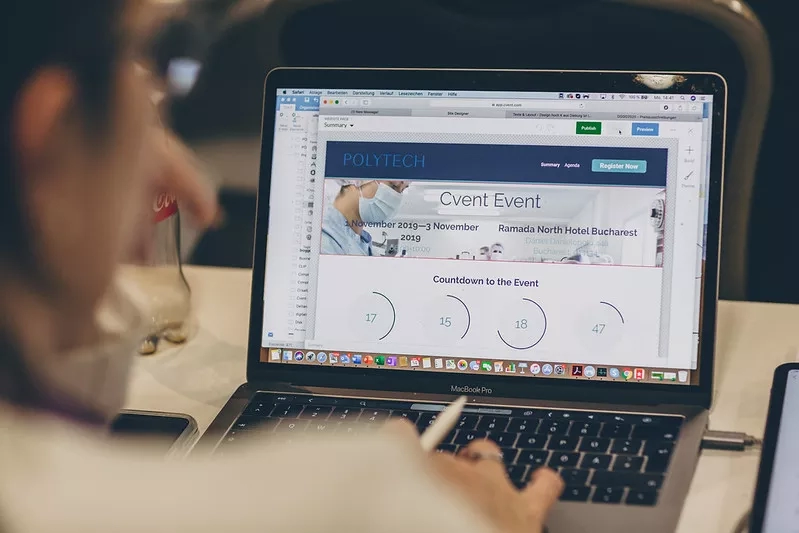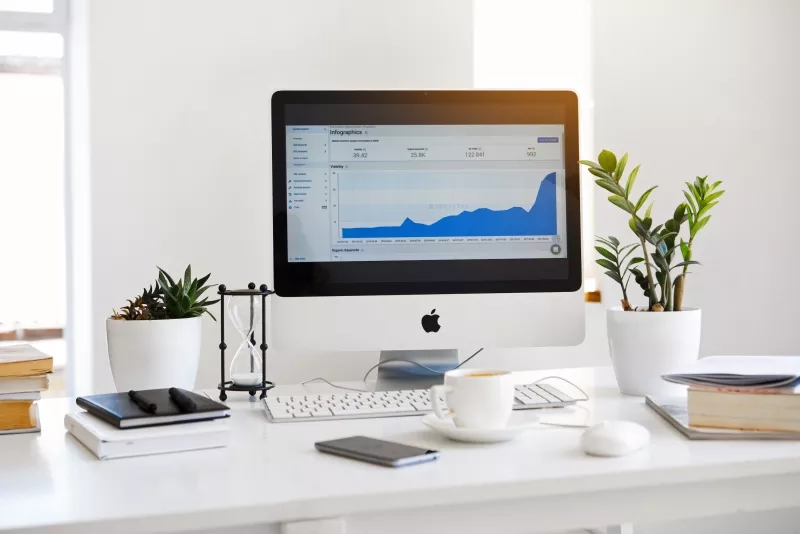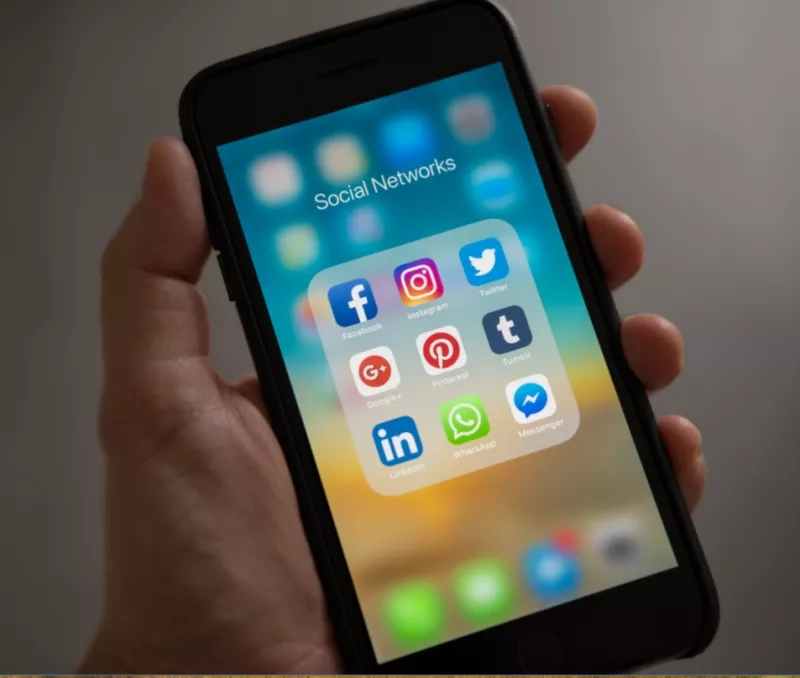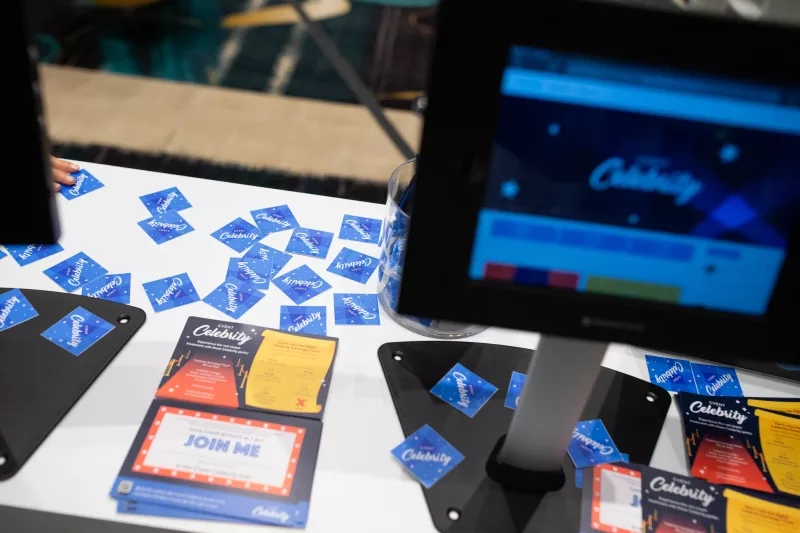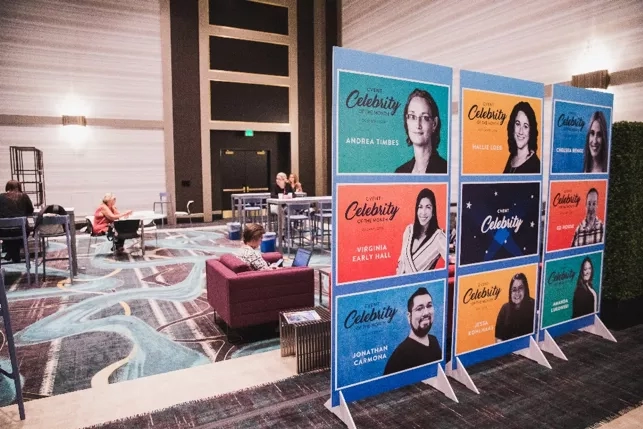Have you ever attended a football game, a live concert, or any major live sporting event? Maybe you’ve even been lucky enough to attend one of the competitions at the Olympics. Remember what it felt like to be part of that crowd? I’m sure you’d agree that the sheer number of people all cheering in unison, singing along to popular chants, and supporting their favorite teams together creates a magical, unique atmosphere.
The audience creates the spirit of an event, be it a sporting event, a film premiere, or a live concert. The more people take part, the higher the excitement and energy levels.
The same is true for B2B events. The more attendees you attract, the more conversations and chatter you generate, and the more successful your event will be.
So, how do you capture as many attendees as you possibly can?
The simple answer is to market your event smartly, creating intrigue and generating interest even amongst casual attendees.
What Is Event Promotion?
Event promotion is the process of marketing an event to potential attendees, sponsors, and stakeholders in an effort to boost attendance and achieve event goals. It requires formulating strategies and tactics that generate awareness and interest in your event to entice your target audience.
This includes utilizing various channels such as social media, email marketing, webinars, and more to reach and engage with your audience. To be truly effective, event promotion requires understanding your target audience, including their needs, preferences, and pain points and the key benefits they'll receive because of your event.
Event promotion depends on your budget and the scale of the event you are planning. If you have big sponsors backing you, you can afford to splurge on large, fancy billboards and glitzy advertisements. But even if your marketing budget is limited, you can use many cool event promotion ideas to reach as many people as possible. Read on to discover them!
1. Optimize Your Event Registration Website
Your event website is the single most powerful tool you can use to promote your event. By opting for an interesting event website template that captures the vibe of your function, you immediately grab the attention of users. A well-optimized event website not only provides users with the necessary information but also acts as a hub for registrations and payments. Here are the different ways in which you can optimize your event website:
Usability Testing
Web visitors form an impression of your website in as little as five seconds. It is important that your website's design immediately sparks visitors' interest. Use tools like Usability Hub’s Five Second Test to understand users’ experiences better when navigating your website.
Heat Mapping
Heat maps are color-coded to visually represent user activity on your website. Information on how much time visitors spend on your website, which features are most interesting to them, and even how far they scroll down the page is available at your fingertips!
A/B Testing
Through A/B testing, you can contrast two different versions of the same webpage to compare audience engagement. While A/B testing usually requires a certain level of technical skill, you can use tools like Optimizely to experiment with different design features, headlines, and call to action.
Web Analytics
Do you use Google Analytics to keep track of visitors to your website? Trick question: your answer should be ‘Yes, of course’! Analytics have become the most important tool to gauge the effectiveness of your website and analyze how many visitors might turn into paying attendees.
2. Offer Early Bird Discounts
We all love discounts. A surefire way of getting more people to register for your event is to provide exclusive ‘early bird’ offers. Set a clear deadline for the early bird pricing or only offer a limited number of tickets – scarcity marketing will create a solid buzz around your event while tempting attendees with a discount they can’t refuse.
3. Leverage Social Media
Given their massive audience outreach, Social media channels like Facebook, Twitter, Instagram, and LinkedIn have proven to be popular mediums for event promotion.
In the UK, Facebook has an active user base of over 30 million people, with around 80% of people in the 23-37 age bracket being frequent users. Here is how you can use Facebook to attract people to your event:
- Create a Facebook page about your event and share it with different groups. If your budget allows, go for paid promotion as well. This will generate quick returns for a small investment.
- Cross-promote the event with an event marketing partner who has considerable influence in generating buzz and increasing registrations.
- Use Facebook Live Video to stream your event promotion activities.
X (Formerly Twitter) is another widely-used medium in the events industry. There are many ways through which you can promote your event on X:
- Create a catchy hashtag for your event and find creative ways to get it trending. You could even devise a competition, encouraging registrants to retweet and include the event hashtag for the chance to win a prize!
- Create an influencer list and target them through smartly crafted @mentions.
- Host a chat, and share live broadcasts.
Event organizers also leverage LinkedIn as an effective promotional tool to entice more event attendees. Given its huge professional user base, LinkedIn can help attract the right audience to your event. You can:
- Write an informative article that has share value.
- Post a short video highlighting all the exciting things about your event.
- Join different groups and promote your event.
4. Use Ad Retargeting
Many users visit your event website, but for some reason, they get distracted and click away from the landing page. You need to hone in on the users who are clearly interested but perhaps have shorter attention spans. Ad retargeting across your Google AdWords account and on the ticket sales page is a great way to continually remind visitors of your event as they visit other websites.
Ad retargeting can have huge benefits. According to Invesp, the click-through rate (CTR) of retargeted ads is 10 times higher than that of a typical display ad, and website visitors who are retargeted with display ads are 70% more likely to convert on a retailer’s website.
You need to consider the following points while attempting ad retargeting:
- Don’t try to sell tickets to just any website visitor: Identify your audience. Do you want to target those who clicked off during checkout? Maybe you want attendees from a particular geographical area only?
- Have you added your tracking code correctly? Retargeting won’t work if you don’t add the right tracking code. You can use Google Tag Manager to manage codes, tags, and pixels for your retargeting campaigns.
- Create multiple ad designs: Different ads work on different websites and devices. Don’t just stop at creating one design. Instead, come up with new, creative messages, images, and colors to maximize your ad retargeting results.
5. Create Exciting Video Content
If there is one way to push your event into the spotlight, it is to create a performance that has the potential to go viral. This could include putting your own spin on popular challenges (think back to the 2014 Ice Bucket Challenge or the early-2019 Blindfold challenge), organizing a flash mob, filming a video featuring adorable puppies… Get creative! Remember, the messaging should be smart and subtle.
6. Incorporate QR Codes
Quick response (QR) codes have been around for some time now. You see them on packages in the grocery store, consumer goods, magazines, and brochures. Given their ease of convenience, they have also become quite popular in the events industry. Most smartphones include built-in QR app readers, so there are several ways to make the most of this technology to come up with some cool event promotion ideas. For example:
- Include a QR code with the digital or printed sponsorship material handed out at your event. Since printed matter becomes outdated in a matter of days, the QR code can provide attendees with the latest news on your event with just a simple scan.
- Whether you are marketing your event through digital or traditional billboards, including a QR code allows any person to scan it and get more details about your event. The information available through the code should be interesting enough to whet the public’s appetite for your event.
7. Create Infographics
Visual content is important to boost social engagement and promote your event. Incorporate storytelling in the form of infographics to provide all the information about your event in a simple, fun manner. Given their high shareability value, infographics are an effective, low-cost visual tactic to generate more buzz around your event.
8. Hire Mascots for Your Event
Never underestimate the power of a cute mascot! A great way to promote your event is to incorporate mascots that represent your event values as well as send positive vibes to attendees. People will want to take selfies with the mascot and share it on social media, thus increasing the brand value of your event. This option, however, should only be considered when your event is spread over 3-4 days.
9. Promote Your (Branded) Merch
Another cool event promotion idea is to hand out exclusive merch such as branded caps, T-shirts, tote bags, or digital paraphernalia such as pop-sockets to attendees before, during, and after the event. It incentivizes people to sign up for your event year after year because, after all, everyone loves free stuff!
10. Create AR-Based Events
Augmented reality has been firmly entrenched into the mainstream consciousness, thanks to games like Pokemon Go, apps like Tik Tok, SnapChat filters, and platforms like Apple’s ARKit and Google’s ARCore. Today, it is no longer a question of whether AR should be incorporated into an event, but how it should be done.
Event planners are leveraging AR technology's creative potential and marketing power to create immersive games that maximize the attendee’s involvement in the event. Brands also achieve higher visibility by sponsoring prizes or including logos in AR advertisements.
11. Geotag Your Campaigns
Geolocation is the new buzzword in event marketing, as marketers are finding new ways of reaching customers through location-based targeting. Even the aforementioned technologies, such as AR advertising is based on the concept of geotagging.
Combine AI and predictive analytics with geotagging to narrow down the behavioral patterns of target audiences and match them to their niche desires. This allows you to take personalization to the next level, by tapping into regional content and local influencers. Ensure to incentivize data collection by highlighting perks and benefits – consumers can be understandably concerned about privacy!
12. Make a Highlight Reel
Create a highlight reel of the best moments from past versions of your event, or release a teaser trailer of keynote speakers and planned activities for an upcoming one. You could even include a celebrity guest cameo! Promotional highlight reels can be short, sponsored videos shared across all social channels; this will certainly create a lot of interest around your event.
13. Try Influencer Marketing
A study by Social Media Today shows that influencer marketing delivers an 11x higher ROI than traditional banner ads. Around 94% of marketers have found it to be a very effective marketing tactic to achieve their goals.
Nowadays, influencer marketing forms an integral part of any event promotion campaign. The underlying principle is simple – influencers and brands have a larger and more loyal audience base, so a sound partnership with one will ensure you get enough registrations for your event. Promote your event by collaborating with a relevant influencer, possibly an industry expert who identifies with your brand and will be a genuine advocate for your event. Through story-telling, conducting contests, and regular brand advocacy, the influencer can significantly level up your brand awareness among relevant prospects.
Importance of Following Up After Your Events
Following up with attendees after your events is crucial for maximizing the impact of your efforts. It not only allows you to gather valuable feedback, but it also shows your commitment to your attendees and allows you to track possible leads. You can follow up in a number of ways, but post-event surveys and targeted post-event emails are great ways to engage your attendees after your event has wrapped.
Post-event surveys allow you to collect valuable insights from attendees, helping you understand their experience, satisfaction, and interests for future reference. By incorporating event surveys into your follow-up strategy, you can strengthen your relationship with your attendees and gain valuable insights to enhance your future events.


